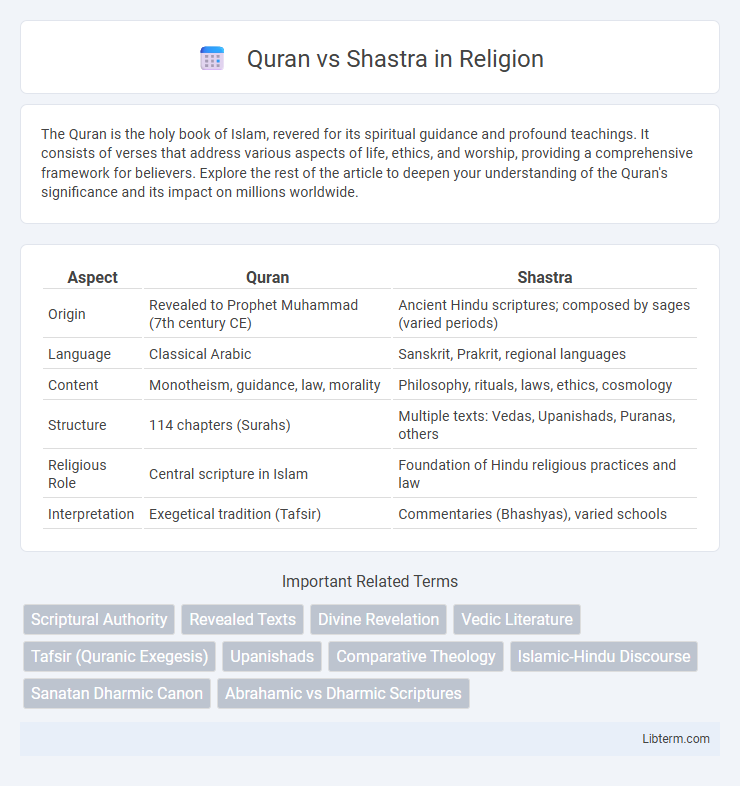The Quran is the holy book of Islam, revered for its spiritual guidance and profound teachings. It consists of verses that address various aspects of life, ethics, and worship, providing a comprehensive framework for believers. Explore the rest of the article to deepen your understanding of the Quran's significance and its impact on millions worldwide.
Table of Comparison
| Aspect | Quran | Shastra |
|---|---|---|
| Origin | Revealed to Prophet Muhammad (7th century CE) | Ancient Hindu scriptures; composed by sages (varied periods) |
| Language | Classical Arabic | Sanskrit, Prakrit, regional languages |
| Content | Monotheism, guidance, law, morality | Philosophy, rituals, laws, ethics, cosmology |
| Structure | 114 chapters (Surahs) | Multiple texts: Vedas, Upanishads, Puranas, others |
| Religious Role | Central scripture in Islam | Foundation of Hindu religious practices and law |
| Interpretation | Exegetical tradition (Tafsir) | Commentaries (Bhashyas), varied schools |
Introduction to the Quran and Shastra
The Quran, revealed in the 7th century CE, is the central religious text of Islam, composed of 114 chapters called Surahs, providing guidance on theology, law, and morality. Shastras, originating in ancient Indian traditions, encompass a collection of scriptures including Dharma Shastra, Artha Shastra, and others, detailing law, social order, and philosophy within Hinduism and related cultures. Both texts serve as foundational sources for their respective religions, shaping spiritual practices and ethical conduct through distinct linguistic, historical, and cultural frameworks.
Historical Origins and Development
The Quran, revealed to Prophet Muhammad in the 7th century CE, is considered the final and unaltered scripture in Islam, encompassing theological guidance and historical narratives that shaped early Muslim society. In contrast, the Shastras, a diverse collection of Hindu scriptures composed over millennia, include texts like the Vedas, Upanishads, and Dharmashastras, reflecting the evolving religious and social laws of ancient India. The Quran's compilation was completed within a few decades after revelation, while the Shastras developed gradually through oral tradition and successive redactions, representing cumulative spiritual knowledge and cultural practices.
Core Beliefs and Teachings
The Quran, central to Islam, emphasizes monotheism, prophethood, and accountability in the afterlife, guiding believers through clear ethical commandments and spiritual teachings. In contrast, the Shastras, encompassing various Hindu scriptures like the Vedas, Upanishads, and Dharma Shastras, present a diverse range of philosophical ideas, ritual practices, and dharma (moral duties) tailored to societal roles and cosmic order. Both texts influence millions, shaping distinct religious frameworks: the Quran with its unifying divine revelation, and the Shastras with their layered theological and ritual complexity.
Language and Structure
The Quran is composed in classical Arabic, featuring a unique rhythmic and rhymed prose structure called saj', which emphasizes phonetic harmony and memorability. In contrast, the Shastras are primarily written in classical Sanskrit, employing various metrical patterns and poetic forms that convey philosophical and ritual instruction through precise technical language. The Quran's concise, poetic verses contrast with the Shastras' extensive, systematic exposition, reflecting differing cultural and religious literary traditions.
Concept of God and Divinity
The Quran presents God (Allah) as a singular, omnipotent, and merciful deity, emphasizing monotheism (Tawhid) and God's direct relationship with believers. Shastra texts, such as the Bhagavad Gita and Vedas, describe divinity in more diverse forms, including monotheistic, polytheistic, and pantheistic interpretations, often portraying God as Brahman, the ultimate reality encompassing all existence. The Quran's focus on transcendence contrasts with the Shastra's combination of immanence and transcendence in its concept of the divine.
Ethics and Moral Philosophy
The Quran emphasizes divine commandments rooted in justice, compassion, and accountability, shaping a comprehensive moral framework centered on submission to God's will and social harmony. Shastra texts, such as the Dharma Shastra, offer an extensive ethical system based on duties, virtues, and cosmic order (Dharma), guiding individual and societal conduct through prescribed roles and righteous behavior. Both scriptures underscore moral philosophy that integrates spirituality with practical ethics, yet the Quran foregrounds monotheistic obedience while Shastras promote a pluralistic and duty-bound approach to ethical living.
Rituals and Practices
The Quran prescribes specific rituals such as Salah (prayer) five times daily, fasting during Ramadan, and Hajj pilgrimage, emphasizing monotheism and obedience to Allah. In contrast, the Shastras encompass diverse rituals including yajnas (fire sacrifices), pujas (worship ceremonies), and samskaras (life-cycle rites), reflecting a broad spectrum of spiritual practices rooted in dharma. While Quranic rituals center on submission to God's will, Shastric practices integrate cosmic principles and social duties into daily religious life.
Role in Shaping Societies
The Quran has played a fundamental role in shaping Islamic societies by providing comprehensive guidance on law, ethics, and social conduct, influencing governance and community life. Shastras, consisting of various Hindu scriptures, have similarly shaped Indian social structures through principles of dharma, rituals, and caste norms, impacting cultural and religious practices. Both texts serve as foundational sources that inform moral frameworks and societal organization within their respective cultural contexts.
Interpretations and Commentaries
The Quran's interpretations are primarily based on Tafsir, which provides linguistic, historical, and theological insights to clarify meanings within Islamic jurisprudence. Shastra commentaries, such as the various Vedangas and Upanishadic exegeses, offer philosophical and ritualistic explanations grounded in Hindu traditions and diverse schools of thought. Both texts' interpretations are shaped by centuries of scholarly discourse, reflecting their unique cultural and religious contexts.
Contemporary Relevance and Dialogue
The Quran and Shastra both offer profound ethical frameworks that continue to shape contemporary spiritual and legal discourses. Engaging in interfaith dialogue reveals shared principles such as compassion, justice, and moral accountability, fostering mutual understanding in multicultural societies. Comparative studies highlight how these scriptures address modern challenges like human rights, social equity, and environmental stewardship, promoting cooperative paths forward.
Quran Infographic

 libterm.com
libterm.com